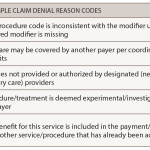ERA can be used to provide timely details about claim payments and claim status from private health plans; EFT is the electronic transfer of funds directly to your bank account. Most physician practices currently submit claims electronically through a medical records system, so adding other electronic transactions is the next step to streamline your revenue cycle. Electronic transactions also help your practice to be environmentally conscious while optimizing your revenue cycle by reducing paper usage.
Qualified Team Members
One of the most important indirect drivers of your practice’s revenue cycle management comes from having an experienced and trained billing team. Ensure all office staff understand the importance of the revenue cycle and the impact of their roles on the overall operations of the practice. Errors ranging from incorrect demographic information to incomplete documentation from the physician can result in claim denials, which can cost up to $40 in staff time to resubmit per rejection. Practice administrators and managers should create a culture that recognizes every staff member has a role in maintaining a well-run revenue management system.
The role of the coding and billing staff in your practice is critical; they not only need to know how to code, but to understand best practices for documentation and billing guidelines to avoid denials and/or audits. The daily performance of the coding and billing staff has a direct impact on your revenue cycle; therefore, it is critical they have access to educational resources to stay current on all payer regulations, coding changes, and industry changes that could have an impact on the success of your practice’s financial health.
Having credentialed and certified staff members in a rheumatology practice is a plus. Keep in mind, the American College of Rheumatology offers the Certified Rheumatology Coder certification, which was created to enable coders to demonstrate superior knowledge in coding for rheumatology services. For more information, visit the ACR practice page.
Communication
Effective communication with the practice staff that oversees your revenue is an important component to achieve a successful revenue management cycle and resolve problems in a timely manner. Staff members that clearly understand their role and purpose in the practice team will be able to efficiently and effectively complete their daily tasks.
Creating revenue cycle processes and protocols is important to keep everyone trained and informed. It is considered good practice to hold open weekly or monthly meetings with the practice staff to review and discuss the financial reports, including accounts receivables, collections and revenues. The meetings should also cover:
- Emphasis on procuring appropriate patient information (e.g., confirmation of the patient’s birthdate and the correct insurance information);
- Be cognizant of and obtain preauthorization for any visits or procedures before the visit is scheduled;
- Make sure documentation in the medical record is thorough; and
- Understand reasons for any denials received for submitted claims.
Performing quality assurance and keeping the practice’s staff informed can ensure that staff follow internal protocols and complete their tasks efficiently and effectively.


